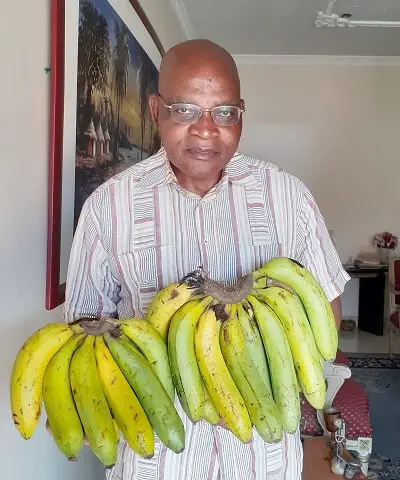Day in the life of
Farmer – Mpenga Kabundi

My Typical Day
There are four important tasks around which I structure my daily work:
- Crop scouting: We start each day checking our plants’ health to proactively anticipate potential problems or initiate quick interventions if we identify problems.
- Land preparation and/or continuous healthy soil building/maintaining
- Planting and/or Field maintenance
- Harvesting and/or orders delivery
Depending on the day, where, and how I focus my time looks different. The only 2 things that I do on a daily basis are scouting and land preparation. The other activities are interchangeable depending on crops and focus for the day.
1. Scouting
This takes anywhere from 1-2 hours a day.
2. Land preparation
This can take anywhere from 3-5 hours a day. Believe it or not, this is where we commit the most time. We spend so much time in soil preparation and soil building—building healthy soil. Build soil that is rich in nutrients. Healthy soil produces healthy plants. Healthy plants produce healthy foods. Healthy foods produce healthy human beings. We’re not just farming to make money; we’re farming to feed people. So, the nutrients of what we grow is so important. You can make money and still produce nutritious foods that improve people’s bodies. We focus on adding organic matter to the soil, cutting grass for mulching purposes, and ensuring we’re doing everything possible across the farm for the soil to be healthy.
3. Planting
2-3 hours a day.
4. Harvesting
Depends on the type of crop and how many we’re harvesting on a particular day, this can take 2-5 hours a day. Vegetables take more time as compared to avocados, bananas, and mangoes. It also depends on the size of our individual orders which can range from 4-5 hour harvesting job to a 30-minute to 1-hour job per order.
Pros
Using an organic farming method has made our farm an incredible space that allows us to build and maintain healthy soils, sequester carbon, and produce tasty, healthy food. Beyond money-making, my drive is to make sure this farm and our concept make it to the next generation, followed by the next generation, etc. With that in mind, I encourage all generations in my family to come up with awesome ideas and experiment on their own plots of land. My daughter, as an example, is experimenting with perfumery and a pop-up farm-to-table experience. are driven by an intergenerational sustainability culture. Our healthy soil is the asset that every member of the family can use.
Cons
Climate Change: Like so many, we are victims of changing weather patterns. In Zambia, where our farm is, we are farming in a landlocked country. Most of our moisture comes from the country of Mozambique and the Indian Ocean. So, we are used to a rainy season that occurs from October through March. However, recent changes in weather patterns have caused our rainy season to start in November and end early in February. Because of this, we are more prone to droughts. We also have to use our irrigation systems at a higher rate than in the past, which has caused us to spend more money on electricity and equipment for stronger irrigation systems.
Commodity fluctuations: When one particular vegetable or fruit becomes popular or easier to grow/sell, the price of that fruit or vegetable goes down. As an example, tomatoes were a very lucrative crop to grow and sell. People learned that the demand was high, and everyone started producing more tomatoes. So, there were so many tomatoes being produced that the selling price of the tomato went down. This meant that it was almost not worth the cost of producing the tomato to sell it, because it was now so cheap to buy. This happens all the time, which is why you have to do two things:
- Diversify what you grow: I don’t just focus on or two crops. I grow many things that are in high demand.
- Grow a superior product: The farm is famous for its bananas, avocadoes, and mangos. People love them! That is how I differentiated myself in the market, so people know if they want the best tasting bananas, avocados, or mangoes, come to P&A Family Farm.
Advice to aspiring Farmers
There are so many pathways that can take you to be a successful farmer. Furthermore, each year of experience will make you grow into a stronger farmer. The following two areas are where I think students can focus some/all of their studies to find success in this field:
- Technical: It’s important to understand some of the science and other technical aspects of farming.
- a. Sciences: The future of farming is in bio-intensive approaches. So, take some science courses like biology to truly understand what that means for farming. Especially if you want to enter the lucrative space of organic farming, the sciences are important.
- b. Health: Understanding relationships between food and health is so important. Remember, you’re growing foods that people consume.
- c. Agricultural: If you can take a course in agriculture, especially one that focuses on soil. Healthy soil is a pathway to more lucrative farming. Even a gardening course sin your neighborhood would be helpful.
- Business Management: As a farmer, you are growing and managing a business. Degrees or courses (even online certificates) I would consider are:
- a. Finance: You’re in the business of making investments in order to make a profit. Understanding financial concepts is really important.
- b. Marketing: You need to understand your customers and how to best sell to them in a way that is attractive and always cutting edge
- c. Project Management: As a farmer, you are a manager of multiple small farms, so you are in essence a very busy project manager. Each crop you grow is a separate project.
- d. Human Resources: As a founder/farmer, the quality of people I hire is critical. I also have to be able to make sure they learn, grow, and are treated well enough to want to stay. I’ve learned the hard way that when your farms become famous, others want to steal your people so they can learn your “secret sauce”
Farm and Ranch Managers
plan, direct, or coordinate the management or operation of farms, ranches, greenhouses, aquacultural operations, nurseries, timber tracts, or other agricultural establishments. May hire, train, or supervise farm workers or contract for services to carry out the day-to-day activities of the managed operation. May engage in or supervise planting, cultivating, harvesting, financial, or marketing activities.






.jpg)